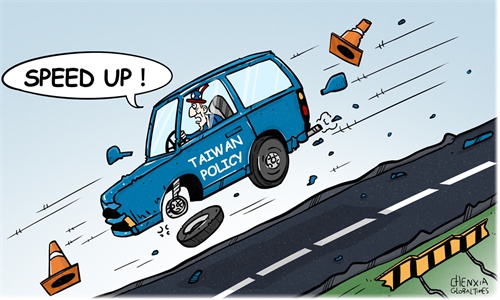
US, Taiwan Illustration: Xia Qing/GT
The meetings on the "US-Taiwan Initiative on 21st Century Trade" are the product of their political collusion targeting the Chinese mainland, and any possible agreement of an "official nature" will be strongly counteracted by the mainland, experts said, following reports that the secessionist Democratic Progressive Party (DPP) in the Taiwan island is scheduled to hold a second round of trade talks with the US next January.
Considering the huge gap in strength between the US and DPP authorities, their new round of negotiations is very likely to follow the rule of "America first" and be guided by the agenda set by Washington, experts said, noting it would be extremely difficult for DPP to obtain substantial benefits for the Taiwan residents.
According to a Monday report from the Taiwan-based Commercial Times, the second round of discussions on the "US-Taiwan Initiative on 21st Century Trade" is expected to be held before the Chinese New Year (January 22). It is also likely that the US will send a delegation to the island of Taiwan for the two to three days of talks on four issues: trade facilitation, small- and medium-sized enterprises (SMEs), good regulatory practices, and anti-corruption drive.
The initiative was launched on June 1, after DPP authorities were excluded from the US-led "Indo-Pacific Economic Framework." The US and DPP authorities held the first round meetings, which were described as "conceptual discussions," from November 8 to 9 in New York.
Even if a deal is signed after the second round of negotiations, its significance will be more political than economic, Tang Yonghong, deputy director of the Taiwan Research Center at Xiamen University, told the Global Times on Monday.
Against the backdrop of the US playing the "Taiwan card" to contain China and the DPP's "dependence on the US for secession," any economic agreement signed by the US and DPP authorities of an "official nature" will be strongly counteracted by the Chinese mainland, Tang said.
Wang Jianmin, a senior cross-Straits expert at Minnan Normal University in Fujian Province, told the Global Times that the US will take the leading role in the negotiation's agenda, and DPP authorities will only have the right to obey.
The US' main purpose is to seek more Taiwan investment, particularly in semiconductors, while the DPP authorities want to expand agricultural exports to the US with reduced tariffs, Wang said. He added that due to the strength gap between the two sides, it will be extremely difficult for DPP authorities to win favorable conditions for the Taiwan residents.
An unequal agreement in which "Taiwan region gives more and the US gives less" will be the best that DPP authorities can achieve, Wang said.
Following the steps of Foxconn and Taiwan Semiconductor Manufacturing, which announced it will invest and set up factories in the US in recent years, Global Wafer, a well-known semiconductor company in Taiwan island, announced in June that it would invest in a new 12-inch silicon wafer plant in the US state of Texas, which is expected to produce up to 1.2 million chips per month.
Experts believe that under such unequal conditions, trade between the US and Taiwan region will not make substantial progress, and it will also be difficult to decouple Taiwan's economy from the Chinese mainland.
According to a public release, "the US-Taiwan Initiative on 21st Century Trade" mainly focuses on coordination in trade facilitation, but has limited substance in terms of liberalizing economic and trade activities, such as opening up investment and trade, Tang said.
Even if a so-called economic and trade agreement can be reached, it will not be of any substantial help to Taiwan's economic and social development, Tang added.
As the economic and trade relationship between Taiwan and the Chinese mainland is based on the complementary advantages of both sides, even if the US and DPP want to deepen the economic and trade relationship through an agreement in order to reduce the dependence on the mainland economy, the effect will be limited, Tang remarked.
The mainland is Taiwan's largest export market and largest source of its trade surplus. If cross-Straits relations continue to deteriorate and the mainland initiates harsher economic countermeasures, it may deal a severe blow to Taiwan's economy, which the empty US initiative cannot compensate for, said Wang.
The mainland is the largest market for Taiwan's agricultural products and accounts for over 60 percent of its semiconductor and computer equipment exports. Despite the protracted impact of COVID-19 and tense relations, the mainland's imports from Taiwan reached $142 billion between January and July, an increase of 5.2 percent on a yearly basis, data from the General Administration of Customs showed.




